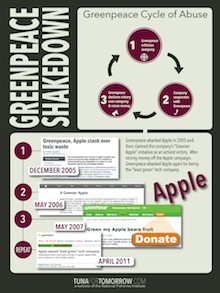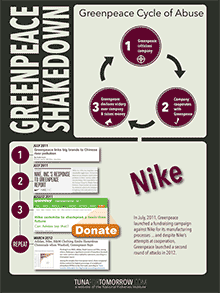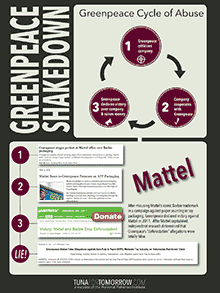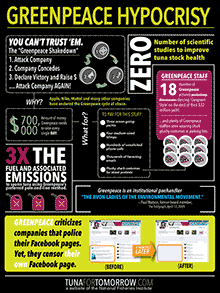Greenpeace recently announced a U.S. supermarket chain it has ranked highly in its retailer rankings previously adopted a seafood sourcing policy that the activist group approves of. The new policy is solely based on how skipjack or light canned tuna is caught without the use of fish aggregating devices (FADs). FADs are a traditional fishing method that uses a float to attract tuna. Fishermen using FADs in the open ocean generally are able to harvest the tuna they are looking for 95% of the time.
Hoping to catch random schools of fish without a FAD does not significantly improve the health of tuna populations or the sustainability of ocean ecosystems. In fact it uses more fossil fuel and makes tuna supplies less reliable and consistent for retailers and their customers not to mention adds significantly to the cost of a can. But it does allow Greenpeace to claim to donors that its harassment tactics are having an effect and to keep giving.
And that’s the problem. Greenpeace’s demands are not based on the latest scientific research but rather what issues will ring the register and bring in donations.
Two weeks previously, one of Europe’s largest canned seafood companies announced a far more ambitious sustainability policy with a commitment to “100% sustainable tuna by 2017.” Yet Greenpeace attacked this commitment and questioned their motives. What is the difference?
Without a scientific basis or even a commonly understood definition of “sustainability” all fishing policies meant to appease Greenpeace are likely to be subjective and ever changing. They may or may not satisfy the pressure group depending on how well their fundraising campaigns are doing that day.
What should a retailer do? Let data lead the way. Science-based organizations such as the International Seafood Sustainability Foundation (ISSF) are quietly doing the hard work of improving outcomes of tuna and ocean ecosystems while Greenpeace is busy drafting and issuing press releases. All the major American canned tuna companies work with ISSF to improve sustainability. Not surprisingly, all of them are also under attack from Greenpeace.
When in doubt, it’s always wise put your trust in science and objectivity over emotional rhetoric and publicity stunts.








